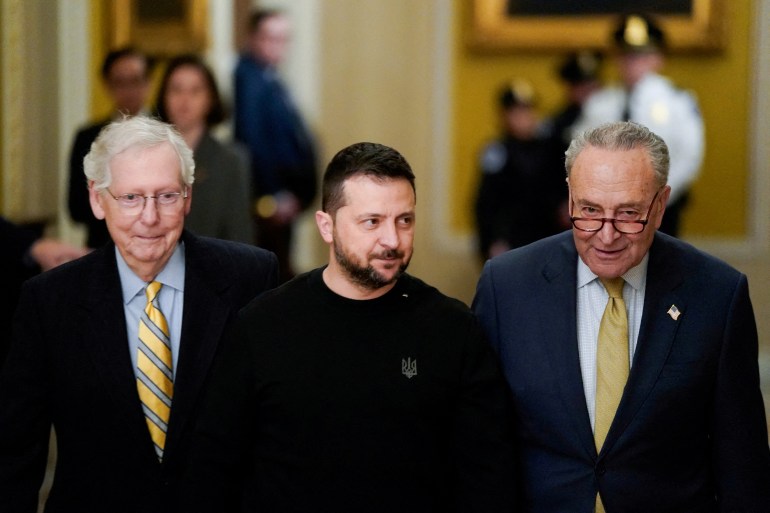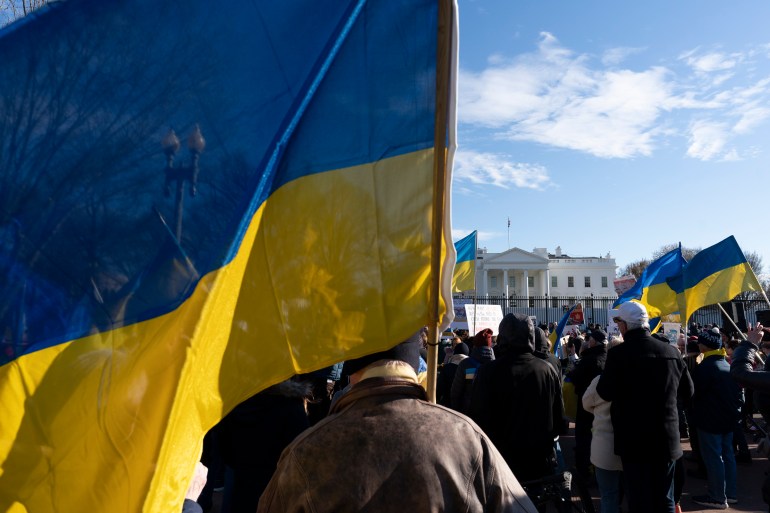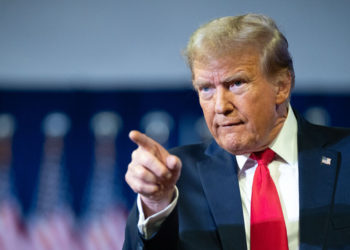By AL JAZEERA
Two years after Russia invaded Ukraine, Americans’ support for the war is waning, creating a surprising alliance between the political left and right.
Forty-one percent of Americans told Gallup pollsters three months ago that the United States is spending too much to support Ukraine on the battlefield. That compares with 24 percent of Americans who felt similarly in August 2022, six months after the start of the war. Perhaps most surprising, though, is that the shift is most pronounced among Republicans, the political party that has historically been known for its hawkishness.
In March 2022, 9 percent of Republicans believed the US was supplying Ukraine with too much military aid; by December last year, 48 percent of Republicans said their government was spending too much on Ukraine, according to Pew Research Centre surveys. The percentage of Democrats who view the Biden administration’s spending on Ukraine as excessive is only 16 percent, according to the same December poll.
To be sure, partisan politics shapes the rift in Washington with Republicans in the House of Representatives refusing to pass legislation that includes $60bn in military aid for Ukraine. Republican House Speaker Mike Johnson has said the bill passed by the Democratic-controlled Senate doesn’t do enough to protect the southern border from immigration, a stance that bolsters Donald Trump’s presidential campaign against incumbent Joe Biden.

And Representative Marjorie Taylor Green leads a group of staunch conservatives in Congress who have consistently opposed US funding for Ukraine. Still, a number of liberals, such as the writer Glen Greenwald and the podcaster Jimmy Dore, have joined conservatives, such as media presenter Tucker Carlson, in questioning the federal government’s priorities in spending billions on a distant war while the US has so many pressing needs, including immigration, affordable housing, healthcare and student debt relief.
“The motivations for the far left and the far right are very different, but what unites them is where they arrive on Ukraine and also this anti-establishment populist strain,” said Dominik Stecula, assistant professor of political science at Colorado State University
Republicans divided on Ukraine spending
While some in the Republican Party — like presidential candidate Nikki Haley and Senate Minority Leader Mitch McConnell — have a traditional national security focus reminiscent of the Cold War, the faction of the party that identifies with former President Trump’s political movement – MAGA, short for his campaign slogan Make America Great Again – is increasingly rejecting Ukraine spending.
Isolationism has been a feature of Trump’s political message since 2016, explained Rachel Blum, an assistant professor in the University of Oklahoma’s Department of Political Science. “That is a really core thread of the MAGA movement.”
The white working-class voters who make up the bulk of Trump’s supporters are animated by the sense that they are being left behind in a shape-shifting economy and money that would be better spent on their families is going to people of colour, the LGBTQ community and big business, including defence contractors. These sentiments often converge with racist, homophobic and transphobic beliefs.
Blum told Al Jazeera that Trump’s isolationism is of a particular type that does not necessarily transfer to other conflicts. “Trump is much warmer toward Israel than he is toward Ukraine,” she explained. “So I think a lot of it has to do with Trump’s very personal animosity toward Ukraine and [Ukrainian President Volodymyr] Zelenskyy and his past problems there and his affinity for [Russian President Vladimir] Putin.”

As the MAGA movement has strengthened its hold on the Republican Party, she said, “it’s not surprising that those sentiments are starting to spill over.”
Republicans are divided between those who remember Cold War policy and view Putin, a former Soviet intelligence officer, as a threat and those who are inclined to blindly follow Trump, she said. In a Venn diagram, those two groups do not overlap. “It’s hard for me to think of an example of a Republican who is pro-Ukraine aid and super supportive of Trump,” Blum said.
As the November election draws closer, Blum said Trump’s position as the presumptive nominee gives Republicans an incentive to oppose aid to Ukraine to win favour with Trump if he returns to the White House.
Foreign policy and the culture wars
A number of factors played pivotal roles in the Republicans’ shift against Ukrainian aid, said David Hopkins, associate professor of political science at Boston College.
A generational divide is part of the story. Older conservatives remember the Cold War alliance between the US and Western Europe against the Soviet Union while younger conservatives don’t have memories of the tensions between the West and the Soviet bloc, he said.
Generally, Americans’ foreign policy worldview is likely to be influenced by authority figures they trust, including politicians and media personalities, he said. And conservatives are reflexively sceptical of policies favoured by Democrats, such as Biden’s support for Ukraine.
Moreover, Trump supporters’ sense of American exceptionalism extends to unfavourable views on Europe – which is seen as not wholly sharing the same values as the US – and, consequently, NATO.
“They are open, just on the merits, to the argument that the US should be looking for ways to remove itself from involvement with European politics and alliances with international allies and organisations like NATO and the UN,” Hopkins said.
Trump supporters are also open to viewing Putin as a traditionalist with similar values to theirs. “Under Putin, Russia has advertised itself internationally as a bulwark of traditional Christianity,” Hopkins said. “I think there are elements of the populist right in the United States that respond very positively to that message and indeed see figures like Putin as ideological allies in the culture war and international politics.”
Far right and far left find common ground
In a July 2022 piece for Foreign Policy, Stecula and co-author Jan Dutkiewicz argued that while the majority of Americans supported aid to Ukraine, many on the far right and far left argued the US should not intervene — an observation they explained with the “horseshoe theory”.
The theory comes from French philosopher Jean-Pierre Faye, who believed extreme political positions aligned like a horseshoe magnet, which widens in the middle before nearly converging at its prongs, Stecula explained.
On the far right, there is a warmth toward authoritarianism, he said. “I don’t think it’s a feature of conservatism, but it’s a feature of the Republican Party right now under Trump.”

He agreed with Hopkins that the populist right is warming to Putin’s agenda, including his anti-LGBTQ policies. “He’s very well-versed in American culture wars. He talks about cancel culture. He talks about woke-ism all the time,” Stecula said.
Meanwhile on the political left, the argument is that the Democrats have become gradually more hawkish since the Vietnam War in an effort to thwart Republican efforts, especially by former President Ronald Reagan, to portray the party as soft, and naive about the threats posed by communism. It is not uncommon, for instance, to hear progressives on popular podcasts express their view that the Democrats have, in fact, become even more hawkish than the Republicans as a means of rewarding their Wall Street donors with windfall profits that accrue from investments in arms suppliers such as Lockheed Martin, Raytheon and General Dynamics.
Leftist writers and pundits contend that former President Barack Obama was the most interventionist, hawkish president in US history, launching air strikes or combat operations in at least seven countries – Libya, Afghanistan, Iraq, Yemen, Syria, Somalia and Pakistan – and dramatically expanding the Pentagon’s military footprints in Africa. And while Trump enthusiastically embraced the wars he inherited from Obama, even progressives acknowledge that he did not start any new wars, and he reduced the Pentagon’s military presence in Africa.
In a 2023 interview with then-Fox News host Carlson, the progressive Greenwald said: “I’ve been asking since February, in what conceivable way will the lives of American citizens be materially improved? How will you or your family’s lives be protected or fostered by sending tens of billions of dollars, now in excess of $100bn, for the war in Ukraine?”
Another popular progressive, the YouTuber Dore, said at an antiwar rally last year: “We could have spent that money saving lives with universal healthcare, but instead, we spend that money taking lives overseas, which is our specialty.”
And Robert F Kennedy Jr, who is popular with both the left and the right in the US, announced his 2024 presidential campaign by contrasting the “$113bn committed to the Ukraine” with the “57 percent of Americans [who] can’t put their hand on $1,000 if they have an emergency” and the “one-quarter of Americans [who] go to bed hungry”.
Stecula attributed the convergence of the left and right on the issue of Ukraine to a populist streak that has long been present in US politics.
“They’re people on the fringes who reject the establishment, who are more anti-elite. And it’s a weird situation where people who are seemingly very different from each other can arrive at similar conclusions about what the US should be doing in regards to the conflict in Ukraine.”







Discussion about this post